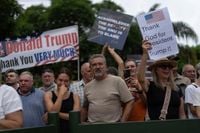On May 10, 2025, the ongoing tensions between the United States and South Africa reached a boiling point as billionaire Elon Musk faced criticism for spreading panic regarding the plight of white South Africans. This turmoil comes amid new land ownership laws in South Africa, which Musk and right-wing groups have portrayed as a threat to the white minority. Meanwhile, U.S. President Donald Trump has taken significant steps, including freezing aid to South Africa and inviting white South African farmers to resettle in the United States.
The controversy began earlier this year when Musk raised alarms about the Expropriation Act, signed by President Cyril Ramaphosa at the end of January. This law allows for 'zero compensation' in specific situations, such as for unused land or land that poses a danger to the public. Critics argue that Musk's claims resonate with white nationalists who believe that white South Africans are victims of unjust racial discrimination.
Trump's administration responded by halting all financial support for South Africa, citing the Expropriation Act as a discriminatory measure against white farmers. In March, Trump offered to resettle these farmers in the U.S., calling them victims of a supposed genocide being perpetrated by the South African government.
As reported by BBC, the U.S. government is set to welcome its first group of white South Africans classified as refugees on May 12, 2025. Fifty-four South African citizens will depart from Johannesburg and arrive at Washington Dulles Airport, where they will be officially received by government representatives. A U.S. official stated that these refugees are prioritized in interviews for resettlement due to their claims of being victims of racial discrimination.
However, the South African government expressed deep concern over this development. The South African Foreign Ministry issued a statement asserting that even if there are allegations of discrimination, they do not justify classifying their citizens as refugees. They accused the U.S. government of using this situation as a politically motivated tactic to undermine South Africa's democratic rule.
Land ownership remains a contentious issue in South Africa, where, three decades after the end of apartheid, the majority of agricultural land is still owned by whites. The Expropriation Act aims to address these historical injustices, but it has faced criticism for being poorly implemented. Inefficiencies in bureaucracy and corruption have hampered land reform efforts, leading to skepticism about whether these reforms will benefit the marginalized black population.
The Economic Freedom Fighters (EFF), a radical populist party founded by Julius Malema in 2013, has been one of the loudest advocates for land expropriation without compensation. The EFF presents itself as a movement for the 'dispossessed', targeting disillusioned youth and the unemployed. However, their approach has been criticized for prioritizing racial conflict over class struggle, often sidelining the needs of small farmers and urban housing initiatives.
While approximately two-thirds of South Africans support land reform in principle, it ranks as a top priority for less than five percent of the population. For many, access to stable employment and basic services remains far more pressing than land ownership issues.
The ANC, feeling the pressure from the EFF and nationalistic sentiments, has also included uncompensated expropriation in its policy platform. Yet, critics argue that the party's motivations are not rooted in genuine concern for land reform but rather a response to rising nationalistic fervor.
In a broader context, the narrative pushed by Musk and Trump feeds into a larger ideological framework that portrays black political power in South Africa as inherently threatening. This rhetoric not only obscures the real challenges of land reform but also perpetuates fears of a white exodus from South Africa.
The idea of white South Africans fleeing oppression for a new life abroad has been a recurring theme since the end of apartheid, yet it remains largely unfounded. Many white citizens, despite their grievances, continue to enjoy a higher quality of life in South Africa than they would likely find as economic migrants in the U.S. or Europe.
William Shoki, an editor at Africa Is a Country, notes that the notion of a mass exodus is more fantasy than reality. Even among those white South Africans who feel victimized, few are willing to leave their homes for an uncertain future overseas. The prominent Afrikaner advocacy group AfriForum has acknowledged that the cost of emigration is prohibitively high for many.
As tensions simmer, the South African government is tasked with navigating the complexities of land reform while countering the narrative that positions it as a failing state. The accusations from Trump and Musk serve as a distraction from the pressing need for effective and equitable land redistribution, which remains a critical issue in the post-apartheid landscape.
Ultimately, the political theater surrounding these developments highlights the ongoing struggle for economic justice in South Africa. The challenge lies in framing land reform not as a punitive measure against white citizens but as a necessary step towards a more equitable society for all.


